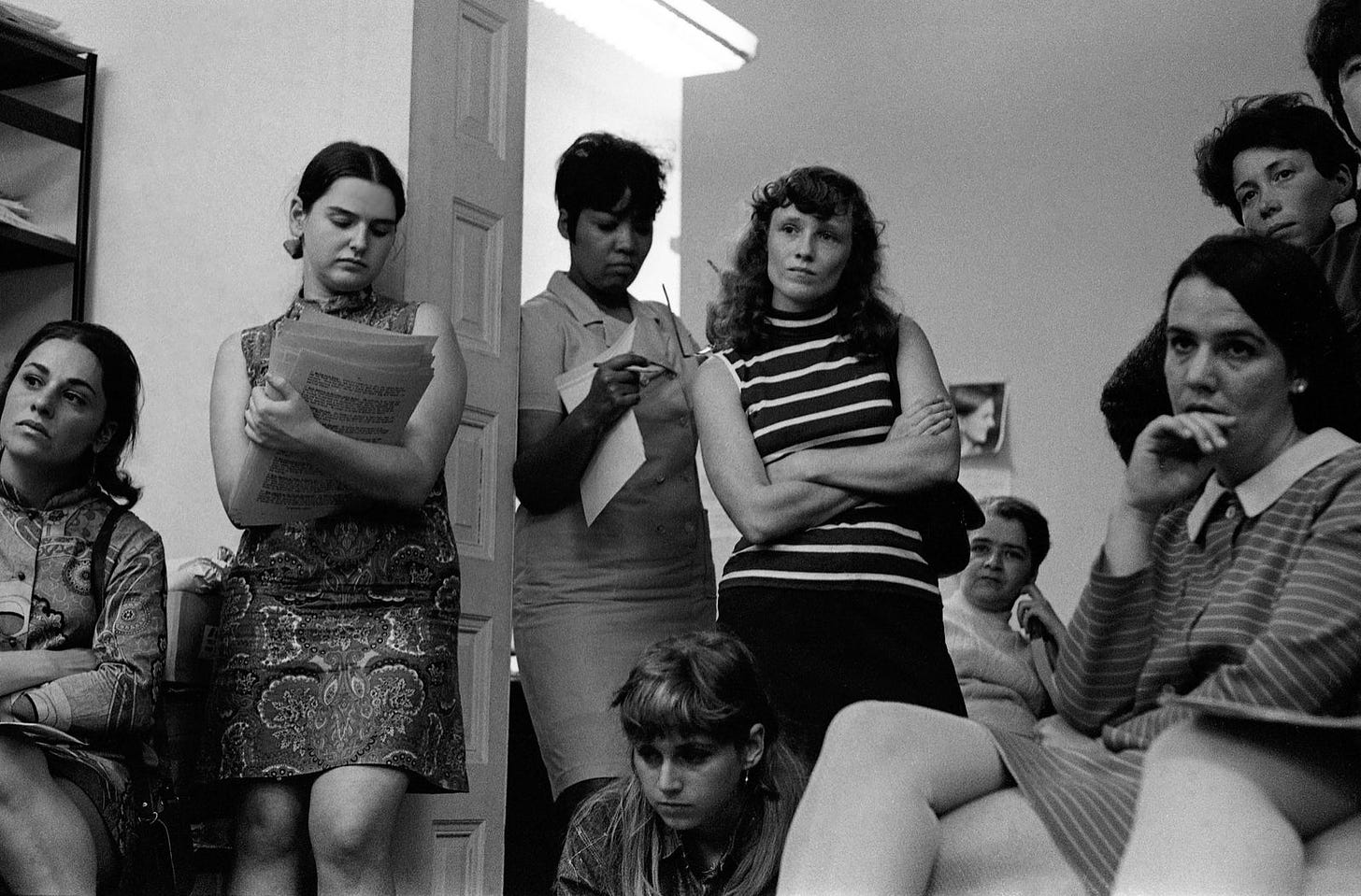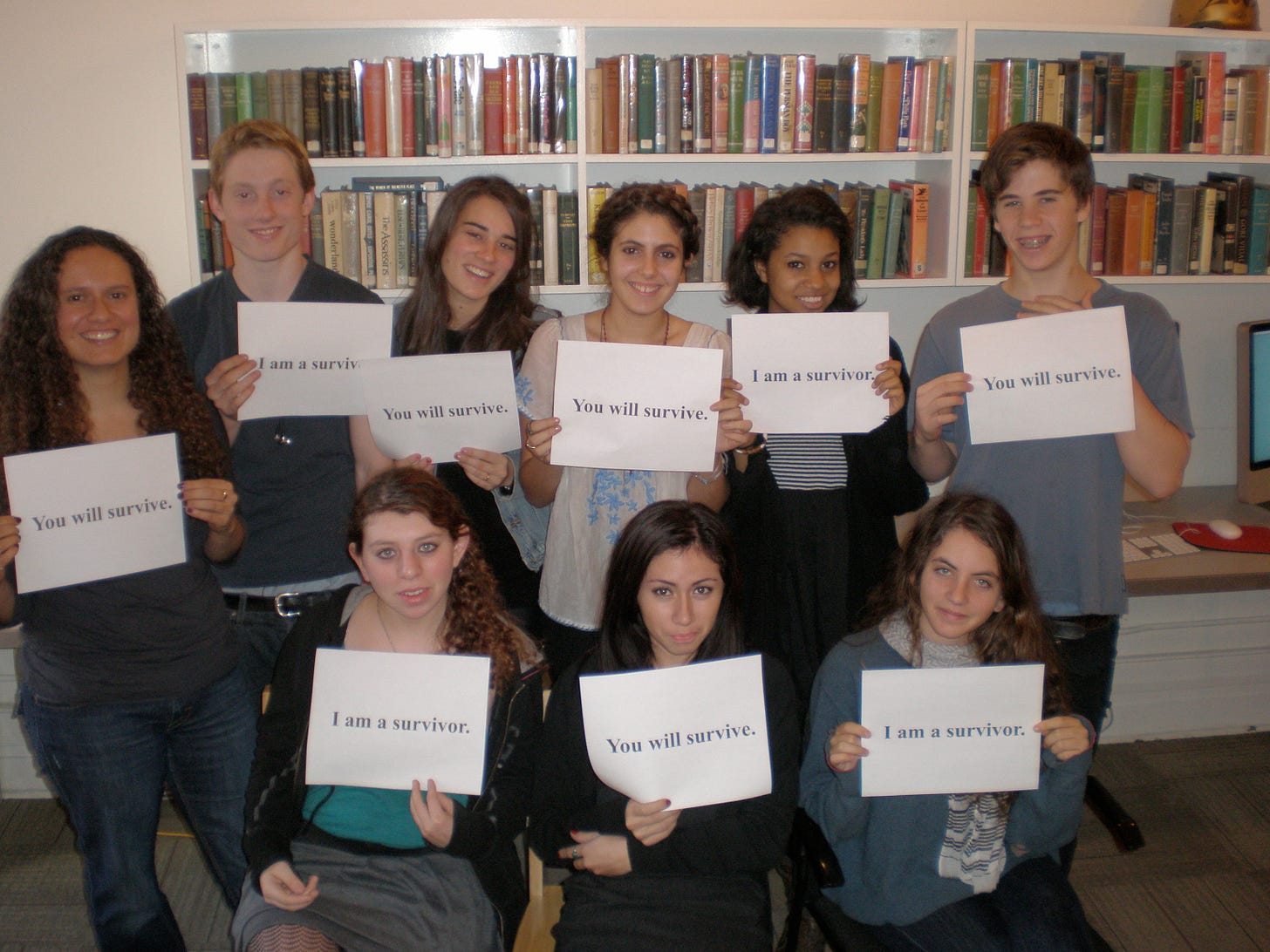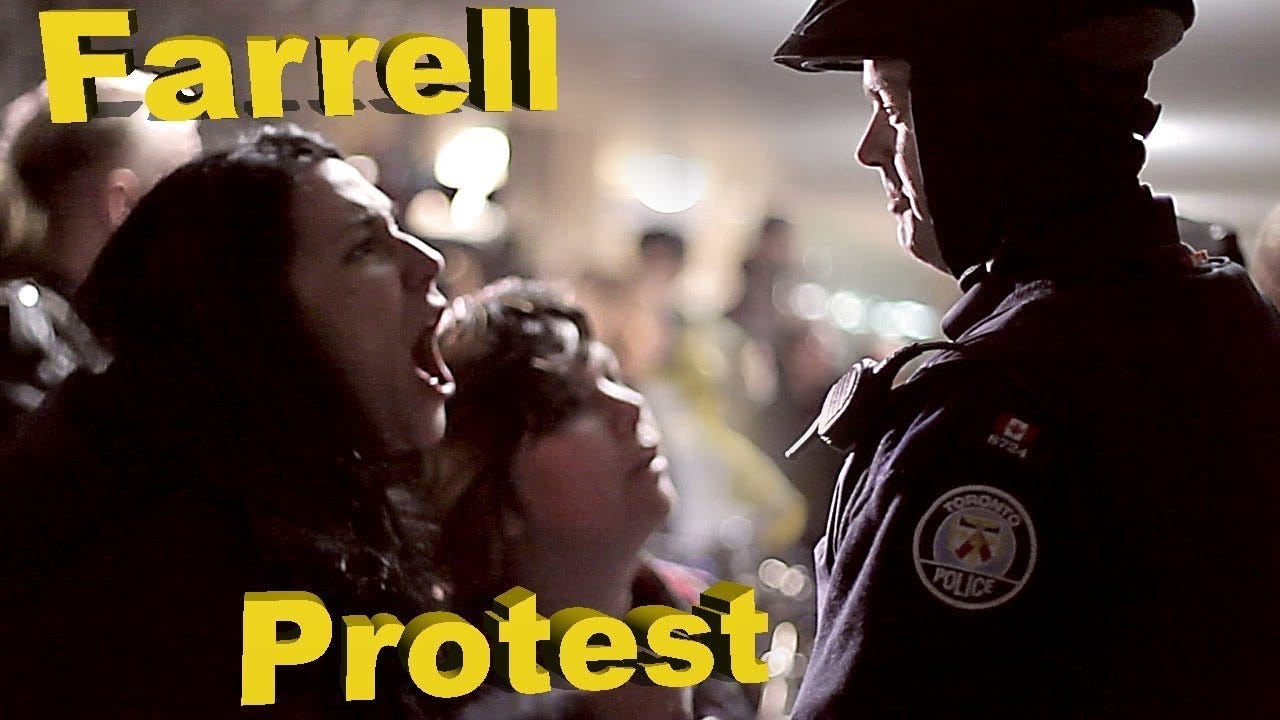The Making and Un-Making of a Feminist Radical: My Story
Though I lived off the outrage-rush for years, I was, in the end, thoroughly sickened by feminism’s hypocrisy and hatefulness
I’ve told this personal story in bits, but here it is for the first time in one go.
Born in Vancouver in 1964, I grew up at the height of the feminist movement. In the Second Grade (’71-’72), I was taught by a feminist zealot who had her students color pictures of women wearing hardhats or driving fire trucks to make the point that girls could be and do anything. Even then, it seemed like overkill: nobody had ever indicated otherwise. The culture was overtly pro-female, and I rode the girl power wave without a thought.
Growing up, I received kind and respectful treatment from every man I encountered in school and elsewhere. My father thought it a matter of course that I would make something of myself. I was not sexually harassed or demeaned, and never witnessed or heard of such from female friends. My parents expected me to take responsibility for my life. I didn’t always follow their advice—in fact, I was a foolish pot-smoking, fast-car-riding teenager fascinated by the romance of danger—but I was never given cause to see myself as a victim.
I always had a passion for reading. With my parents’ encouragement, I completed a Bachelor’s degree, a Master’s, and a PhD in English literature at the University of British Columbia. After two years as a Post-Doctoral Fellow at Simon Fraser University, I landed my first full-time teaching position at the University of Saskatchewan, where I taught for four years. After that, I became a professor at the University of Ottawa, where I remained until my retirement in 2019.
When I interviewed at both Saskatchewan and Ottawa, there was not a single man on either four-person shortlist. So-called equity hiring—which usually amounted to the outright (or near-outright) exclusion of men from job competitions—was in full swing; it had been going on for about a decade and is still going on now, 25 years later (see the research of Martin Loney on the history of such hiring in Canada). How many generations of young men will have to be sacrificed to the great god of equity before feminists say enough?
The feminist mantra of heroic female victimhood had been the air I breathed as a university student, and it offered a near-irresistible fantasy of moral purity. I was a woman and therefore good. Men had to prove themselves good by allying with women against other men. I came to like the heady rush of sisterhood and the exhilarating fury of feeling oneself part of a wronged group. I particularly enjoyed the vision of myself as a bold heroine speaking against oppression (and being applauded and rewarded for it).
Everything on campus was about women. Vigils for the Montreal Massacre were a yearly opportunity for ideologues to decry the supposedly widespread misogyny that made women’s lives, even at the most progressive institutions on earth, a hell of assault, put-downs, and discrimination. The university women’s center, where no man could tread (well, actually …) , offered women a “safe space” to learn about patriarchy and to plot its downfall.
Special programs for women, especially in the STEM fields, were widely available, and even in disciplines such as English, where women had long participated equally with men, feminist theories about heteropatriarchy and female resistance were inescapable. Perhaps because I was so excited about ideas (or perhaps because I was not nearly as smart as I thought I was), I was attracted to the most extreme of the feminists: Andrea Dworkin with her evangelical denunciations of male evil, Catharine MacKinnon with her abstruse arguments about rape as indistinguishable from normal sex.
Did I believe them? My own life was nothing like what Dworkin or MacKinnon described. I had never met a man who expressed hatred for women. Love and dating were benign, not abusive, experiences. But the possibility that Dworkin and MacKinnon were wrong didn’t occur to me. If they were wrong, why did so many respected academics take them so seriously? There were entire departments devoted to studying and disseminating theories like theirs. It was exciting to discuss feminist authors in seminars, to march in Take Back the Night rallies, to be angry and (self) righteous.
Many female graduate students of my era were involved in the feminist project of “re(dis)covering” female authors, spurred on by Sandra Gilbert and Susan Gubar’s contention, in The Madwoman in the Attic (1979), that every female writer was possessed of an impassioned awareness of her unjust exclusion. It was an article of faith that traditional standards of literary excellence were male-centered. I wrote feminist papers in my graduate courses, and not a single professor rebutted my sweeping assertions about female subordination. I had short hair and Doc Marten boots, and I volunteered at a women’s shelter and rape crisis hotline.
But my feminist fantasy petered out when I completed graduate school in the late 90s, like a mirage that, once clear and vivid in its outlines, began to shimmer and fade. I went out to spread the feminist gospel and found that church and state were already one. Where was women’s oppression? I certainly couldn’t find it in the university classroom. My male students were not privileged. On the contrary, many young men seemed cowed by feminist rhetoric: puzzled and embarrassed. I began to wonder what it must be like to sit in a classroom, day after day, year after year, listening to feminist teachers pontificating about male entitlement and sexual violence.
These young men heard regularly about (and did not contest, for the most part) the need to protect women, respect women, ask for women’s consent, believe women, empower women, and encourage women to enter male-majority fields. They learned that their sex was responsible for all the ills of the world. Men were not encouraged to do anything except follow women’s lead. If only more women were in power, so the narrative ran, we could end war and right wrong. There were feminine ways of knowing and being, and these were superior to masculine ways of knowing and being. I heard high-powered academics refer to phallogocentrism as the male-authored system of reason, mastery, and power that should be dismantled by radical women and their allies.
Nothing was ever said about the good that men had done and continued to do, how men built our societies through their hard work, ingenuity, and love for their families. Their sacrifices in war and body-wearying labor through the centuries were never mentioned. The implication was that whatever achievements men had made in science, medicine, engineering, technology, and art came about because of an unfair advantage: women could surely have done better, given the chance.
When we discussed women, the emphasis was always on empathizing with their difficulties, their valor. We were never to empathize with men. Why would anyone empathize with arrogance and cruelty? Let them help themselves (a woman actually said this to me once when I was working at the rape crisis center and received a call from a man who had been raped. I had to tell him that we did not offer counseling or any resources for male victims, not even time on the phone). If men suffered, it was because they had created such a sick, oppressive system that even the privileged oppressors were made unhappy within it.
And even though women now had a demonstrably unfair advantage at university because of hiring and other equity protocols, that was not enough. More needed to be done for them, and men were still privileged. Feminists asserted that there was a vicious rape culture on university campuses for which drastic measures both proactive and punitive were necessary. Men were to be encouraged to reflect with shame on their hegemonic masculinity and to join campaigns to end violence against women (but not violence against men, which was ignored).
Throughout the 2000s, I noted all this and chafed. I became a critic of feminism in my academic writing, and I sought to teach from a male-positive perspective. Then one day, in the fall of 2012, there came the watershed: I saw a video clip of a feminist protest at the University of Toronto where men’s advocate Warren Farrell had been scheduled to speak about his research on the “boy crisis.” The video (filmed by Steve Brulé) showed a group of feminist students, mainly female but with some male helpers, blocking the entranceways to the building and verbally abusing the men waiting to get inside.
The scene was intense. Some of the protestors told the attendees they were “f—ing scum” and “rape apologists” for wanting to hear Farrell. En masse they gave the Hitler salute to the police and campus security, chanting “This is what men’s rights looks like!” and purpling the air with their curses.
What did men’s rights look like: some mild-mannered men exhibiting great self-restraint while waiting to hear a talk by a mild-mannered man about the difficulties of boys and young men. For this, they were sworn at and called names by the incensed activists, who managed to delay the talk by over an hour.
I thought about what would have happened at the University of Toronto if a large contingent of anti-feminists (impossible to imagine, of course) had aggressively stopped young women from attending a talk by, say, Gloria Steinem. I found it very difficult to believe that the university would have allowed such a group to break the law and bully attendees for over an hour, and would afterwards have refrained from any public statement condemning the agitators. So much for men’s rights!
This was the feminist movement by 2012 (and long before that): a sanctioned hate group determined to prevent men even from discussing their lives. Whether it was a campus men’s group, a men’s center, a male-positive lecture: there was always a group of purple-haired, black-clad activists with bullhorns trying to stop it, shouting “No Platform for Hate!” and talking nonsense about women’s safety being threatened by men talking.
The sanctimonious tyranny of their actions—and the total refusal of feminist leaders to speak against it (in fact, their active support of such tyranny)—demonstrated that the vast majority of feminists couldn’t care less about gender equality.
After that day, I began to speak publicly, and to make videos with my friend Steve Brulé about feminist lies and injustice towards men.
Feminists have succeeded, perhaps even beyond what they imagined or intended, in creating a culture that has little place for men except as the source of tax dollars as well as alimony and child support (for the wives who kicked them out and the children they’re no longer allowed to see); also, of course, as the butt of jokes in television commercials and sit-coms, and the recipients of seemingly endless public campaigns to shame them for everything from complimenting women in the wrong way to taking up too much space on the subway.
The wonder is not that some few men hate women, but that most men don’t.
I’m embarrassed it took me so long to see the truth.







Thanks for sharing your story. I went through something similar. Feminism is at best obsolete and at worst vicious and dishonest. Women who think they don’t need men are like children who think they don’t need adults. Men are indispensable civilization-builders, creators, thinkers, laborers, fighters, lovers, fathers, and friends. Their capacity for love, romance, and self-sacrifice is heart-breaking. I feel ashamed of my whiny feminist period and disgusted with women who want to disempower men even more. Maybe a little love and gratitude are in order.
I was a feminist for 30 years. I was happy to give strong support for women’s equality—one in a long line of male voices dating back to, well, even before John Stuart Mill. Appealing to my innate sense of fair play regarding perceived injustices suffered by women, as I was told there were, I was seduced by feminist ideology. I’m now highly critical of the movement. There came a time when I felt conned by feminism which presented injustices which were simply and factually false. It also highlighted desirable rights for women but singularly failed to talk about responsibility and how women had contributed to social inequality and what, if any, obligations they had to society and to men. I view feminism harshly but remain pro-woman. The theme often is, “if you’re against feminism you must be against women and their struggles for equality.” I am for women. And I am for men—for both sexes realizing their full potential as human beings.
I spent those 30 years believing that feminism what “just about equality” and believing that a fairer, kinder world was possible once the inequalities between the sexes had been addressed. I’ve been on women’s marches and automatically favored any and all social and legislative efforts which sought to redress any perceived imbalance. I cared about women’s issues. And I still do today. But my understanding is now far more nuanced. My own internal bias favored women’s voices above men’s because of the ongoing injustices I believed they experienced as a group. Had I heard any rebuke of feminism coming from a man, I would have instantly judged him to be defending his privileged position and trying to muddy the water. So it wasn’t until I heard such a rebuke coming from the mouth of a woman, Karen Straughan, that I started to question my belief paradigm. I can now hear men’s pain where before I was deaf.
Feminism masterfully passes itself off as a social good in a way that makes invisible and insidious the harms it does. It can do so because, as a society, there is an assumption that femininity (and, by extension, women) is inherently full of goodness and beauty—indicating a presumed moral superiority. By contrast, men are considered inherently problematic (if not toxic) and must be tamed and subdued so as to reverse past transgressions, and to then step off the plate.